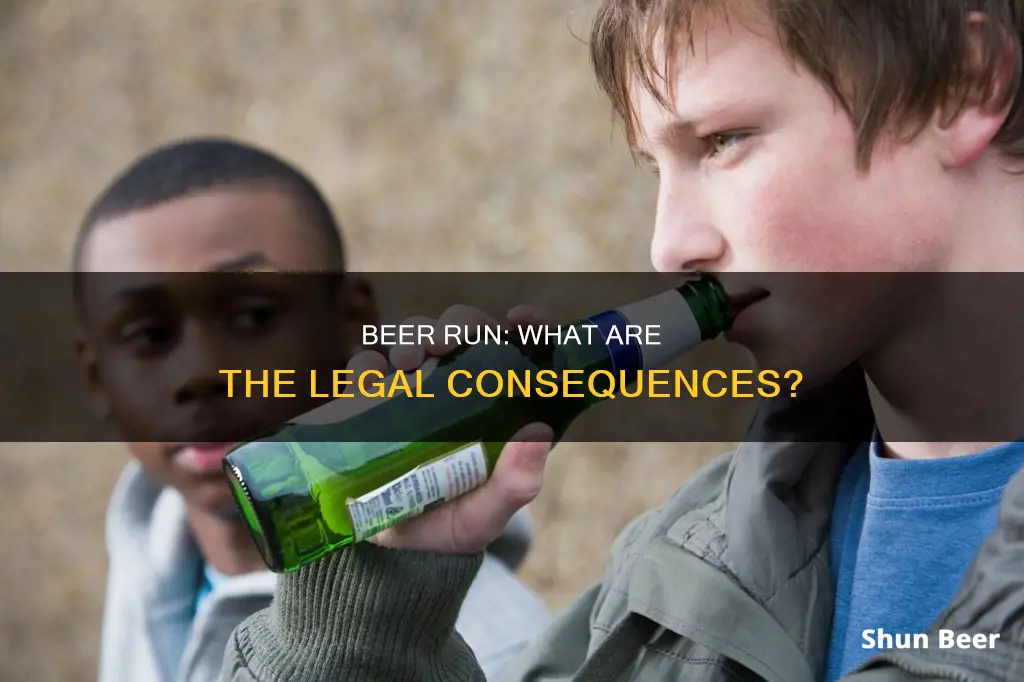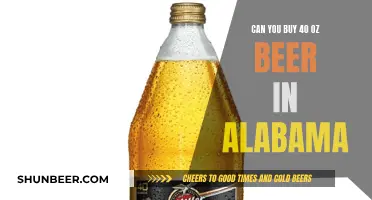
In the United States, the legal drinking age is 21 years old. While there are some exceptions in certain states, it is generally illegal for anyone under 21 to possess, consume, or purchase alcohol. If an adult over the age of 21 provides alcohol to a minor, they can face a fine and even jail time. Minors who attempt to purchase alcohol can be charged with a Class C misdemeanour and may have to participate in an education or substance abuse program, pay fines, and perform community service. The consequences for providing alcohol to a minor vary depending on the state and the circumstances, but they can include criminal charges, administrative actions, and personal actions.
| Characteristics | Values |
|---|---|
| Legal drinking age in the US | 21 years old |
| Minors in possession of alcohol | May be charged with an infraction, face fines, mandatory alcohol-awareness programs, and community service |
| Purchasing alcohol for minors | Crime, may be charged with a misdemeanor or a felony |
| Selling alcohol to minors | Businesses may lose liquor licenses, face fines, or be shut down |
| Attempting to purchase alcohol as a minor | May be charged with a crime |
What You'll Learn

Legal repercussions for buying alcohol for a minor
In the United States, the legal drinking age is 21 years old, and it is a crime to supply an underage person with alcohol. The laws apply to everyone, whether they are licensed to sell alcohol or not.
The legal repercussions for buying alcohol for a minor can vary depending on the state and the specific circumstances. In most states, even allowing a minor to be in a home where alcohol is available and not blocking their access to it is defined as supplying alcohol to a minor. This means that adults do not have to be physically present or provide the alcohol directly to be charged.
If caught buying alcohol for a minor, individuals may face criminal charges, including misdemeanour or felony offences. The penalties for supplying alcohol to a minor can include jail time, fines, probation, and community service. Businesses that have liquor licenses may also face administrative actions, resulting in additional fines, license suspension, or revocation.
In New York, for example, if a minor is caught with alcohol, they could be charged with an infraction and may have to participate in an education or substance abuse program, paying associated costs. They may also face university or school disciplinary action, including suspension or expulsion.
It is important to note that the laws and penalties regarding underage drinking and supplying alcohol to minors can vary by state, and individuals should refer to their specific state laws for detailed information.
Buying Beer in Michigan: Sunday Shopping Laws Explained
You may want to see also

The right of a liquor store to refuse service
In the United States, it is generally illegal for anyone under the age of 21 to possess, consume, or purchase alcohol. The specific legal consequences of buying alcohol for a minor vary from state to state. In Texas, for example, minors who purchase, attempt to purchase, possess, or consume alcoholic beverages face Class C misdemeanour charges. In New York, minors caught purchasing alcohol may be fined, and be required to complete an alcohol awareness program and community service.
Liquor stores, as alcohol-serving establishments, are vulnerable to legal challenges. Bartenders and servers are expected to know when to stop serving patrons and to be able to recognise the signs of intoxication. There are several legitimate reasons to refuse service to a patron, including:
- Underage individuals
- Those who are showing symptoms of intoxication
- Excessively rowdy or unruly customers
- A person harassing staff or other customers
- The establishment is at capacity
When refusing service, it is recommended that servers slow down service and ensure a manager is involved. The manager should then take the patron to the side to inform them calmly and without aggression that they will no longer be served.
Buying Beer After Midnight in Arizona: What's the Law?
You may want to see also

The legality of minors drinking alcohol under parental supervision
In the United States, the laws regarding minors drinking alcohol under parental supervision vary from state to state. While the legal drinking age is 21 in all states, there are exceptions that allow underage consumption of alcohol under certain circumstances.
In most states, minors are allowed to consume alcohol in the presence of their parents or guardians. This is often limited to private locations, such as the family home, and the parent or guardian must be at least 21 years old. Some states also allow minors to consume alcohol for religious or medical purposes.
However, it is important to note that even in states with exceptions, there are still strict laws prohibiting the provision of alcohol to minors by anyone other than a parent, guardian, or spouse. These laws are in place to prevent underage drinking and carry significant penalties for those who violate them.
The consequences for minors caught in possession of or consuming alcohol can also vary depending on the state and the severity of the offense. In some cases, minors may face fines, be required to participate in alcohol awareness programs, or perform community service. Repeat offenses can result in increased penalties.
In summary, while there are exceptions in many states that allow minors to drink alcohol under parental supervision, it is essential to be aware of the specific laws and regulations in your state, as they can have significant legal ramifications.
As for the question of buying beer for a minor, it is generally illegal to do so and can result in legal consequences for the purchaser. The laws regarding this vary by state, but it is always best to refrain from providing alcohol to anyone under the age of 21 to avoid any potential legal issues.
Beer and Wine Licenses: Michigan's Easy Access
You may want to see also

The consequences of providing alcohol to a minor
Providing alcohol to a minor is illegal in the United States, with the legal drinking age being 21 years old. There are some exceptions in certain states, where parents, guardians, or spouses can offer or supply alcohol to an individual under the age of 21. However, in most cases, supplying alcohol to a minor is considered a crime.
Individuals convicted of supplying alcohol to minors may also face additional penalties, such as probation, community service, and the suspension or revocation of their driver's license. If the person supplying the alcohol is a business owner, they may face administrative actions, including additional fines, license suspension, or license revocation.
It is important to note that the laws prohibiting the supply of alcohol to minors apply to everyone, not just establishments that serve or sell alcohol. Even allowing a minor to be in a home where alcohol is accessible can be considered supplying alcohol to a minor.
Michigan Minors and Non-Alcoholic Beer: What's the Law?
You may want to see also

The legal drinking age
In other parts of the world, the legal drinking age is often set at 18 years. However, some countries have a minimum legal drinking age of 19, while others have no laws restricting the sale of alcohol to minors. The laws regarding the legal drinking age can also vary within a country, with different states or provinces having different minimum ages. For example, in Canada, the minimum age to buy or consume alcohol is 19 years in most provinces, but it is 18 years in Alberta, Manitoba, and Quebec.
It is important to note that the legal drinking age is not always the same as the age at which alcohol can be purchased. In some countries, the minimum age for consumption may be lower or higher than the purchase age. Additionally, some countries have exemptions or special circumstances that allow minors to consume alcohol under certain conditions, such as when they are accompanied by a parent or guardian.
Regardless of the legal drinking age, it is generally illegal to purchase or attempt to purchase alcohol if you are under the minimum age. The consequences of violating these laws can vary but often include fines, community service, and participation in alcohol awareness programs.
Sheetz Gift Card Beer Purchase: Is It Allowed?
You may want to see also
Frequently asked questions
In Mississippi, a minor in possession of beer or alcohol can be fined up to $500, serve 30 days of community service, and/or have their driver's license suspended for 90 days.
In Mississippi, a person who is 18-21 years old and in the presence of their parent or legal guardian may consume beer with their parent or guardian's consent.
In 48 states in the U.S., it is prohibited by law to sell alcohol to individuals who show obvious signs of intoxication. However, a study found that 82% of licensed alcohol establishments sold alcohol to pseudo-intoxicated buyers.







